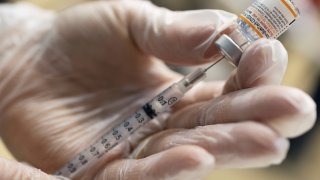
- The FDA determined that a third Pfizer shot can boost protection for children in this age group and the benefits outweigh the risks, said Dr. Peter Marks, who heads the drug regulator's vaccine division.
- FDA Commissioner Robert Califf said although Covid tends to be less severe in children, more kids have been getting sick and hospitalized with virus since the omicron variant became dominant.
- The FDA did not convene its committee of independent experts before authorizing the booster dose.
The Food and Drug Administration on Tuesday authorized a third shot of Pfizer's Covid vaccine for children ages 5 to 11 at least five months after their two-dose primary series.
Dr. Peter Marks, head of the FDA division responsible for vaccines, said data increasingly shows that the protection provided by two shots wanes over time. The FDA determined that a third shot can help boost protection for children in this age group and the benefits outweigh the risks, Marks said.
Get Tri-state area news delivered to your inbox.> Sign up for NBC New York's News Headlines newsletter.
The FDA decided to authorize a third shot after analyzing data from an ongoing Pfizer trial, in which a subset of 67 children in this age group had higher antibody levels one month after receiving a booster dose. The drug regulator did not identify any new safety concerns and found the children experienced the same mild side effects that other people do after receiving a booster. Those side effects include injection site swelling, fatigue, headache, muscle or joint pain, chills and fever.
The Centers for Disease Control and Prevention's committee of independent vaccine experts has a meeting scheduled for Thursday, in which they are expected to issue a recommendation for or against the boosters. CDC Director Dr. Rochelle Walensky has the final say on whether health-care providers should start administering the shots. Walensky normally backs the committee's recommendation.
The FDA did not convene its committee to discuss the data before authorizing the booster dose. Some committee members have grown frustrated that the drug regulator has repeatedly moved ahead with decisions on booster doses without holding open public discussions.
Money Report
Only about 28% of children ages 5 to 11 had received their primary series of two doses as of April, according to data from the Centers for Disease Control and Prevention. FDA Commissioner Dr. Robert Califf, in a statement Tuesday, encouraged parents to get their kids vaccinated to protect them against the virus. Califf said although Covid tends to be less severe in children, more kids have been getting sick and hospitalized with the virus since the omicron variant became dominant in the U.S. over the winter
Covid infections are rising again in the U.S. as more transmissible subvariants of omicron spread throughout the nation. The U.S. reported more than 90,000 new infections a day on average as of Sunday, a 30% increase over the week prior, according to CDC data. New hospital admissions of people with Covid have also increased 8% over the past week, according to the CDC.
Almost every age group in the U.S. can now receive at least three vaccine doses with the exception of children under age 5, who aren't yet eligible for a primary vaccination series. The FDA's advisory committee is scheduled to meet next month to review Moderna's and Pfizer's requests for the drug regulator to authorize their vaccines for kids under age 5.






